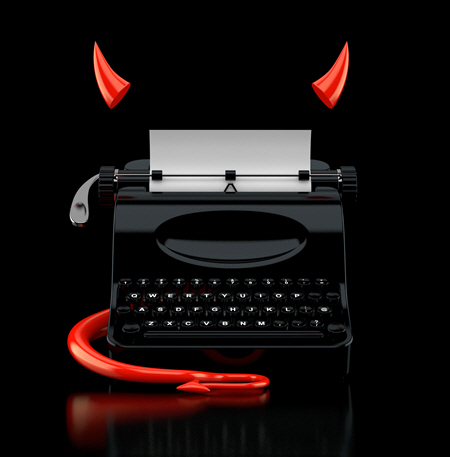 Deadlines can be so lonely.
Deadlines can be so lonely.
It’s 3 am. The world is asleep. It’s just you and the empty page staring back like an accusation. Jacked on coffee but totally exhausted. The worst part is you did it to yourself.
You had two weeks to hand in this writing assignment, and somehow, it’s come down to the very last minute – again. You’ve done everything except write. Organized your sock drawer. Deleted large files on your computer. Played several hundred hands of blackjack. Now it’s time to write. Finally. Really. Now.
Focus! You try to think about the work and what you want to say. Suddenly, your thoughts turn on you.
Why do you always procrastinate? Do you secretly want to fail?
It’s just like that 401k you should have started in your 20s but didn’t…
I know how it feels – bleary-eyed staring at a blank page.
Beating yourself up isn’t going to help you finish this project. You know this. Your editor, professor, or boss doesn’t care about your personal issues and how they impact your writing.
But I do. I’m not just a therapist but a writer and editor with 30+ years of getting the job done. I’ve stared down that blank page thousands of times, and I know a few things about the unique psychology of writers and the demons that come out when a project is due. I know that:
Most of the time, writers would rather do anything else than write.
Pressure can be motivating. But it’s a high price and keeps you from doing your best work.
Personal problems, real and imaginary, tend to crop up with great urgency at deadline time.
A therapist who is also an editor can help you with the work AND with all the mental drama that keeps you from working.
 You name it; I’ve worked with them.
You name it; I’ve worked with them.
I’ve worked with authors, students, and non-writing civilians when they’ve been faced with that deadline crunch. As a writer, editor, and therapist, I have the training to understand both the writing AND the writer.
Writing is deeply internal work and can kick up your most painful personal business. I can provide professional editorial feedback on the writing itself. Over the years, I’ve developed a set of psychological tools and techniques to help you finish your work with minimal mental distress. As a writing coach, I can:
Motivate you when you’re stuck and help you find the path forward.
Help you outline and organize your writing beforehand, and break down your deadline into short, manageable assignments. I’ll also hold you accountable for meeting those smaller deadlines.
Help you work through emotional issues that pop up when you are writing.
Just as important, together, we will distinguish between urgent problems that need your attention right now and what I like to call “procrastination problems.” These are not-so-urgent issues that your brain tricks you into focusing on instead of writing.
Help you reduce negative self-talk and develop an inner voice that enhances your creativity instead of crushing it.
I’m also trained to treat substance use issues that tend to flare up when writers are under pressure. It’s not just the chemicals; these issues can take the form of unhelpful behaviors that distract you from the work, such as playing video games, masturbating, and shopping online.
You can pleasure yourself while playing solitaire and buying a rare vintage concert t-shirt after you meet your deadline!
 What kind of person needs a writer and a therapist?
What kind of person needs a writer and a therapist?
Professional writers who want to improve their writing, not just turn in copy on time.
Artists who want a therapist who truly understands the creative life.
Non-writers working on thorny workplace projects.
Aspiring writers with a story they need to tell.
Professional procrastinators who want to curb their perfectionistic tendencies.
There’s an amazing piece of writing on the other side of that deadline. There’s also freedom and a good night’s sleep. The satisfaction of following through and finishing. The pride you will feel knowing that you did your best work.
Why are you still reading this? The clock is still ticking. Your project is still due.
Let’s get to work together!

